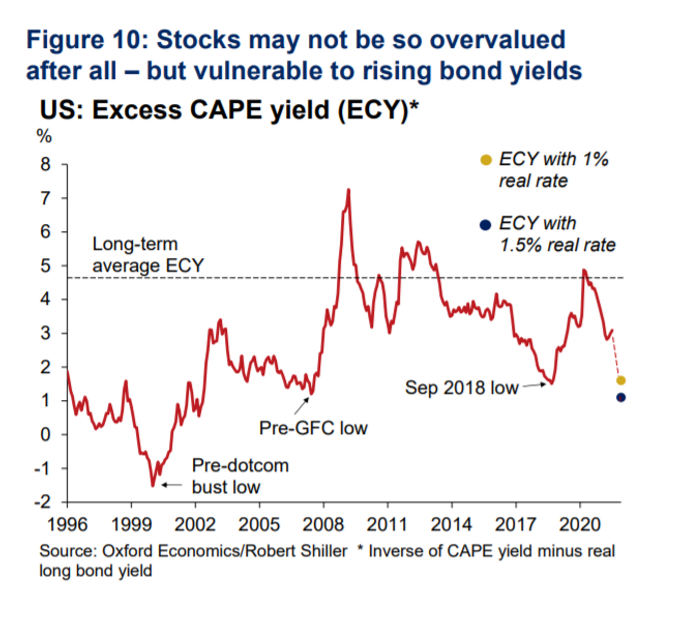1.International Weighting Hits Lowest Level Since 2006
Blackrock

https://www.blackrock.com/us/individual/insights
2.Small Cap Technology Stock ETF Makes New Highs.
After 8 months sideways small stock tech breaks out

3.Seven Month S&P Win Streaks Produce Positive Future Returns

LPL notes when the S&P 500 is up 7 months in a row – 6 months later higher 13 of 14 times, with an impressive 7.9% average return.
From Dave Lutz at Jones Trading
4.Here’s why Robert Shiller’s two stock-market indexes are telling wildly different valuation stories.
Marketwatch By
Steve Goldstein
When making the argument that stocks are overvalued, one index often is trotted out — the cyclically adjusted price-to-earnings ratio popularized by Robert Shiller, the Yale professor and Nobel laureate. The index uses earnings over the last decade, rather than a single year, to provide a long-term perspective. July’s reading of 37.98 is more than double the average, and the highest since the dot-com bubble.

The traditional cyclically adjusted price-to-earnings ratio.
ROBERT SHILLER’S WEBSITE
But Shiller himself has moved onto a different metric, called the excess CAPE yield, which considers both equity valuation and interest-rate levels. It’s defined as difference between the inverted CAPE ratio and the 10-year inflation-adjusted interest rate.

Adam Slater, lead economist at Oxford Economics, used the excess CAPE yield model to look at what’s currently going on. As the chart shows — and remember, since we’re looking at yield, low numbers imply higher valuations — current valuations aren’t outrageous.
Slater says Oxford’s fair value models for government bonds suggest yields are expensive by anywhere from 20 to 100 basis points. He writes that there’s “a fundamental problem with the low rates argument –– that we may be comparing one overvalued asset class with another.”
Now much has been made about what could move yields higher, but hot inflation readings lasting for longer than the Federal Reserve expects would be the likely catalyst.
Put another way, if real rates rise to where they stood at the end of 2018, Shiller’s new valuation measure would move to 2007 territory — right before the global financial crisis.
5.Global Semiconductor Sales Hit Record in Middle of Shortage
Wolf Street-Global semiconductor sales collapsed by 32%, starting in October 2018 through April 2019 because cryptocurrencies had collapsed starting in late 2017, with Bitcoin crashing 85%, from $20,000 in December 2017 to $3,200 by December 2018, which caused demand for crypto mining rigs to collapse, which caused demand for their specialized chips to collapse.

Semiconductor Shortages amid Record Semiconductor Sales?
6.Covid Current Metrics
Cases May be Peaking at Average 150,000 per Day

Source: Calculated Risk
Barry Ritholtz Blog https://ritholtz.com/2021/09/10-wednesday-am-reads-253/
7.Single Family Rental Homes Increasing at Huge Premium vs. Apartment Rentals

House Rents Pop Up as New Investors Pile In- By Will Parker https://www.wsj.com/articles/house-rents-pop-up-as-new-investors-pile-in-11630402201?mod=lead_feature_below_a_pos1
Redfin…Inventories Recovering
https://twitter.com/Redfin

8.WOW…
CHARTR BLOG

The last of the US soldiers in Kabul have officially left, leaving the task of governing the people of Afghanistan firmly at the feet of the Taliban.
History repeating itself?
Throughout the last few weeks Taliban leaders have been quick to offer up an image of a “more moderate” Taliban than the one that ruled the country from 1996-2001 — a period which saw a strict interpretation of Sharia law. Among many other imposed rules, that meant a complete ban on female education.
During the Taliban’s absence, Afghanistan made significant progress on the issue of education. Data from the World Bank reveals that from 2001 to 2018 the number of girls enrolled in primary school in Afghanistan jumped from pretty much 0% during the Taliban rule, to over 80% by 2018 (chart inspired by one from the FT).
That progress, along with so much else, is now at risk.
9.Technology and Covid Upend Another Market-Art.
Four Powerful Art Dealers Join Forces, Upending Traditional Model
Dominique Lévy, Brett Gorvy, Amalia Dayan and Jeanne Greenberg Rohatyn will become LGDR, a one-stop shop for artists and collectors.


Aug. 31, 2021
In one of the strongest signs yet that the art market will not look the same after the pandemic — and in an apparent effort to counter the increasing dominance of mega galleries — four prominent dealers have made the unorthodox decision to consolidate under one roof.
Dominique Lévy, Brett Gorvy, Amalia Dayan and Jeanne Greenberg Rohatyn in January will become LGDR, a consortium that will represent artists, organize exhibitions, advise collectors and broker auction sales.
In joining forces, the foursome are betting they will be more effective together than separately at a time when the gallery sector has seen a 20 percent drop in sales (to an estimated $29.3 billion), and many small and midsize galleries are closing because of the high costs of operating.
The partners, who are dissolving their existing businesses and merging into one entity, aim to offer a new model of one-stop shopping that would give artists and collectors the benefit of having four experienced dealers with different areas of expertise. The consortium could eat into the livelihood of rival art advisers, auction houses and art fairs.
Disrupting the traditional art market model further, LGDR plans not to participate in any costly American art fairs — such as Art Basel Miami or Frieze New York — attending only those in Asia, where fairs remain an important gateway to a wider array of young collectors.
“We’ve been looking at ourselves in the mirror and trying to understand who we are and what is the best way to address our clients,” said Gorvy, 57, during a joint video interview with his partners. “What is the business model that is appropriate? We don’t have to do everything, but we can do anything.”
https://www.nytimes.com/2021/08/31/arts/design/art-gallerists-lgdr-consortium.html
10.7 Words and Phrases That Make People Think Less of You Professionally
If you don’t have anything productive to say, don’t say anything at all.
BY MARIA HAGGERTY, CEO, DOTCOM DISTRIBUTION@MHAGGERTYCEO
Radio host Bernard Meltzer is famously quoted as having said, “Before you speak, ask yourself if what you are going to say is true, is kind, is necessary, is helpful. If the answer is no, maybe what you are about to say should be left unsaid.” I find that this is as true in the workplace as it is in personal life.
That said, here are seven unhelpful words and phrases anyone in the workforce should consider removing from their professional vocabulary.
1. I can’t.
“Whether you believe you can do a thing or not, you are right.” Henry Ford was quoted as having said in 1947, and it holds up even today. I have my own version. Whenever I’m asked for my best advice, I always say, ” ‘I can’t’ is rarely accurate. ‘I choose not to’ is often the most accurate.”
Article continues after sponsored content
FIREFLYSPONSORED CONTENT
Street.IQ: Taking OOH Advertising Down the Digital, Data-Driven Path
I say “rarely” because some things are inarguable truths. I know I can’t defy gravity; that’s a fact. But if I say I can’t lift a heavy weight, that might not be true. What’s true is that, so far, I have chosen not to do the work required to lift a heavy weight. Most of the time, what you can or cannot do is a choice. Try replacing the negative “I can’t” with the positive “How can I?” and see what changes.
2. Very.
This one is just lazy, but more to the point, it usually doesn’t mean anything. There are far more effective adjectives and modifiers that can be used in place of “very.” Rather than say someone is very capable, describe them as skillful, or swap “very tired” for “exhausted.”
3. That’s not my job.
You would be hard-pressed to find an individual who’s never been asked to take care of something that wasn’t technically their job. Yes, it can be a frustrating scenario, and there is a time and place to push back, but does this phrase help anyone on either side of the question?
The inherent problem with “that’s not my job” is that it often implies a task is beneath you. Even if you feel it is, consider a more productive response that contributes to accomplishing the intended goal. Something else to consider is that being asked to handle work that’s outside your scope of responsibilities could lead to bigger opportunities down the line.
4. I don’t have time.
File this in the “not productive” column. News flash: Everyone has the same amount of time in a day. Telling a co-worker, boss, or client you don’t have time for something is rude, but moreover, it can cast an unflattering light on your time-management skills. Alternate phrases include variations of “Can we discuss this when I’m finished with the project I’m working on?” or “I’m all booked up today but tell me when you need this and I’ll let you know if I can take care of it.”
If the request is coming from above and your bandwidth is truly stretched, you can also present your current list of tasks and ask if there is something you should de-prioritize in order to accommodate the new ask.
5. You’ll have it soon.
“Soon” is not quantifiable and is therefore heavily subject to interpretation. Without hard deadlines, things often slip off the radar. Providing a firm date or time not only sets clear expectations, it can also help keep you accountable. If you’d prefer more flexibility, commit to a window of time (e.g., “You’ll have it Wednesday, Thursday at the latest”).
6. We should.
This usually implies kicking the can down the road. “We should” should only be used in conjunction with a definitive, time-boxed action item.
7. I don’t know.
On its own, “I don’t know” is a dead end. And while it’s improved when followed by a commitment to finding an answer, a better approach is to provide the information you do know. It’s the difference between “I don’t know when the shipment will arrive” and “The shipment was scheduled to arrive on Monday; I will follow up with the carrier for an update and come back to you by the end of the day.”
Not all of these words and phrases offend all people, of course; there are always contextual variables at play. But language is what we use to create and foster relationships. Being aware of, and thoughtful about, how we use it and how it affects others can be a total game-changer.
Inc. helps entrepreneurs change the world. Get the advice you need to start, grow, and lead your business today. Subscribe here for unlimited access.
AUG 28, 2021
The opinions expressed here by Inc.com columnists are their own, not those of Inc.com.